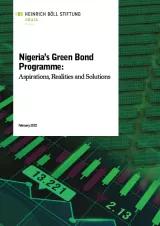Nigeria's Green Bond Programme
Content is no longer being updated
To deliver on its nationally determined contributions (NDCs) to the Paris Climate Agreement, the Nigerian government issued the first sovereign green bond in Africa in 2017 and a second green bond series in 2019. In doing so, the country raised NGN 10.69 billion and NGN 15 billion in 2017 and 2019 respectively to finance energy and land-use projects, among others. Unfortunately, independent reports on the environmental, social and economic performance of financed and implemented NDC-aligned projects have been unavailable.
Against this backdrop, this study was motivated not only by the urgency and significance of raising funds via the issuance of green bonds to achieve the country’s NDC targets, but also by the desire to help ensure the actual achievement of the set environmental, social and economic targets and outcomes expected from NDC-aligned projects.
The implementation and effects of most human and infrastructure development projects in Nigeria remain obscure due to a lack of transparency and accountability, low community inclusion and the flagrant absence of sustainability checks and scalability mechanisms. This includes other “green” finance projects such as the NGN 9.2 billion clean-stove initiative of 2016 and the Great Green Wall project.1 It is crucial to ensure that projects funded and implemented with green bond proceeds do not fall into the same trap and that they live up to the sustainability standards that were set for them.
This report hopes to make a meaningful contribution towards ensuring that mechanisms for transparency, accountability, sustainability and value for money are put in place throughout the processes of green bond issuances in Nigeria. The unresolved issue of the causes of previous development setbacks signals a warning of imminent pitfalls for green-bond-financed projects if deliberate, proactive institutional reforms are not put in motion to address existing gaps.
Ultimately, the study hopes to help ensure that the NDC-aligned projects funded by green bond proceeds are not only labelled “green” but are indeed green, sustainable, economically viable, socially inclusive, gender-sensitive and represent good value for money.
